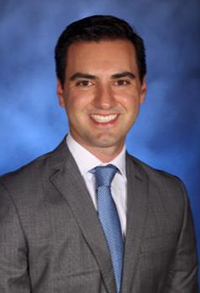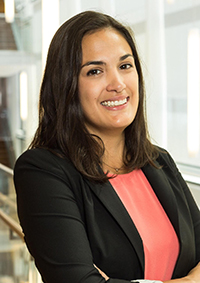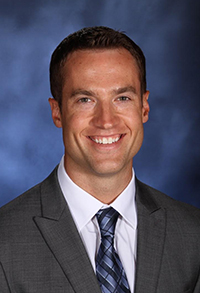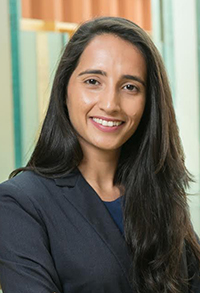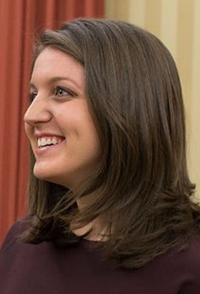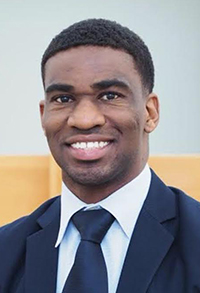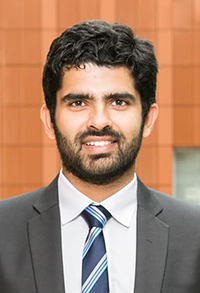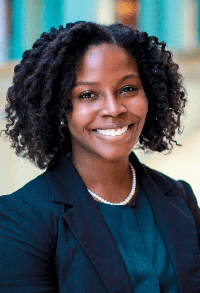A Look at Some of the Coolest Internships Ross MBAs Are Working on This Summer
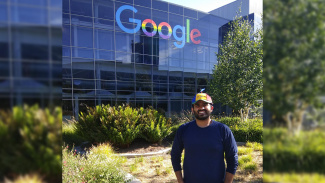
From tech to nonprofits to financial services, rising second-year Michigan Ross MBA students are busy working across the world this summer in internships that will take them out of their comfort zones, and prepare them to have an impact in their future careers on day one.
Students in the Ross Full-Time MBA Program are working in internships with companies big and small, with the largest internship employers for Ross MBAs this summer being tech and consulting firms.
In fact, the top five hiring companies for Ross MBA interns were Amazon, Deloitte, Bain & Company, McKinsey, and Microsoft. But those aren’t the only experiences Ross students are having this summer.
From work on corporate partnerships with Snapchat to education policy with the Bill & Melinda Gates Foundation, we asked students working in some of the coolest internships around the world to tell us about their experience, what they’re working on, and how future students can follow in their footsteps.
Here’s what they had to say:
JUMP TO AN INTERNSHIP
Interning with: NextGen Growth Partners - Chicago, Ill.
What are you up to?
I'm currently working on the acquisition of two different businesses with operations in the southeastern part of the U.S. I manage a group of four analysts, with the main mission of doing the valuation models, due diligence and information memorandums of the potential investments to be presented to senior management. Also, I lead the process of deal sourcing, which is identifying potential niches within industries and identifying companies within those industries that fit the investment thesis of the firm. This is done using a proprietary model of the fund.
How do you like it?
I am really passionate about business strategy, corporate finance, and valuation, so I love how the private equity industry gives me an opportunity to deep dive into those fields. The best part of the experience, however, is managing the team of analysts and seeing how they have progressed in their understanding of business concepts.
Any tips for incoming MBAs interested in this industry?
They should be very active in their finance and strategy classes during the first year. Also, I would recommend that they be up-to-date on all relevant events in business and the economy by reading daily news and business publications (WSJ, Bloomberg, etc). Also, I recommend to double down on off-campus networking with private equity firms, since these firms don't go to campus as frequently and don’t have as many positions available compared to other industries.
Interning with: Apple - Cupertino, Calif.
What can you tell us about your internship?
I work in AppleCare on their supply planning team. My project is focused on a global analysis of AppleCare's stock balancing practices and identifying any opportunities for improved efficiency or cost reduction. What is unique about my project is that it spans across all product lines worldwide, so I've had the opportunity to meet a lot of people in various functions and learn a little bit about each of the products and how they are planned.
Have you been enjoying it?
The best part about this experience, aside from gaining invaluable insight into the tech industry at one of the largest tech companies in the world, is the people I have met during my time here. The incredible Ross alumni at Apple and my fellow interns have been incredible resources, introducing me to different areas of the business.
Apple also hosts intern-exclusive speaker series featuring several C-suite executives who have the opportunity to share more about their organizations and what they are working on.
It sounds pretty great - any advice for other students wanting a similar internship?
Network as early and as effectively as you can. During my first year at Ross, I tried to leverage as many of the recruiting opportunities that came my way, like treks over Fall Break, off-campus networking events, or company-specific webinars. I recommend to anyone, especially if you are looking to recruit off-campus, to take advantage of as many of these recruiting events as you can. The Ross Career Development Office also has amazing resources for students, so don't hesitate to reach out to them if you need any additional recruiting tips.
Interning with: Civic Consulting Alliance - Chicago, Ill.
Tell us what you’re working on this summer.
I’m working for Civic Consulting Alliance (CCA) on a project geared toward improving the workforce development system for the Chicago region. The current workforce development system is trying to deal with a wave of new technology and rapidly changing business requirements, in which skills training and job matching has sped up immensely. This requires new approaches for job seekers and employers alike.
CCA was brought in to assess the current workforce development system while also looking at the feasibility and way forward for a fellowship to help prepare the system for the future economy. My work on the project has been broken up between interviewing experts in the workforce development field, government agencies, employers, and fellowship directors, and then compiling and analyzing this information to help develop recommendations for a fellowship program for our client.
Sounds like quite a project - how are you enjoying it?
The exposure I’ve gotten to the unique intersection of public and private partnerships has been amazing and eye-opening. I’ve had the chance to see just how important it is for private and public organizations to work together on important goals like employment, education, and transportation. I’ve also had the pleasure to meet and work with some amazing people who work on these problems every day and truly make an impact.
What advice do you have for someone who may want a similar experience?
Keep yourself open to opportunities outside the traditional/on-campus recruiting experience. It’s easy to get tunnel vision when the pressure of finding an internship hits you, and sometimes that can make you feel as if you need to pick from the group of employers that are in front of you. Take a step back, really assess what you’re trying to get out of your internship experience (and understand that it doesn’t have to be the same as everyone else), and then pursue those opportunities that are right for you.
Interning with: Facebook - Menlo Park, Calif.
What can you tell us about your internship?
I can’t share too much, but my project has revolved around making Facebook’s infrastructure sourcing decisions as data-driven and risk-averse as possible. I spend my day digging into data, conducting interviews, and communicating findings – it’s almost like being an internal consultant.
Is it what you expected?
Working for one of the world’s largest tech companies has been perpetually challenging and exciting, which is exactly what I hoped for. That said, I’m still really surprised by the scale of my project.
Facebook has four apps that boast upwards of one billion monthly active users (Facebook, WhatsApp, Messenger, and Instagram), and each app depends on Facebook’s infrastructure to run. Playing a role in planning and building this infrastructure is a massive responsibility for an intern, and having the chance to make such a huge impact has been incredible.
How can someone else interested in an internship like this land the job?
Decide which role you want and don’t be fazed by rejection. Large tech companies will have postings for finance, marketing, supply chain, strategy, and everything in between. Determine which roles interest you and tailor your recruiting strategy accordingly. As you apply, remember that every MBA who interned in tech this summer can name a dozen companies they were rejected from. Don’t take rejection personally, and don’t give up.
Interning with: Inspiring Capital - New York, N.Y.
What are you up to this summer?
I am a Social Impact Fellow at Inspiring Capital. Every summer, Inspiring Capital runs an MBA Fellowship where they pair MBA and undergrad interns with socially responsible businesses or nonprofits to work on a project.
My client is mebl | Transforming Furniture, a furniture retailer that sources products made from reclaimed wood and metal from furniture makers across the world. The business is still in a very nascent stage, and I’m working with an undergrad intern to build out a strategic plan and financial model for the next three years.
What drew you to this internship over others?
The two primary reasons I was drawn to this internship were (1) the opportunity to test the business skills I have picked up at Ross in a social impact context, and (2) the immense focus that Inspiring Capital has on intentional personal and professional development.
I saw this internship as one where I could leverage my strengths while simultaneously pushing myself outside my comfort zone to learn new skills, and that seemed like the ideal way to spend my MBA summer. I’m happy to report that I was right!
Any advice for students who also want an internship with impact?
For anyone who is looking to pursue an internship in social impact, I would say it's very useful if you can figure out what about the space interests you. Social Impact is a broad term, understanding your desires like this will help make your job search more focused and intentional. I would also note that the timeline for impact internships is slightly later than on-campus recruiting — this doesn't mean you don't have to work hard during the early parts of the year, it just means you have to wait longer for the results.
Interning with: Glossier - New York, N.Y.
What projects have you been working on this summer?
I haven’t focused on a single project, which is something I’ve really appreciated. I’ve experienced so many parts of Glossier, and no two days are the same. My primary focus has been on a strategy for the evolution of Glossier's web presence. I’m collaborating with the user research team, along with stakeholders across the company, which has been awesome.
Why did you want to intern in the beauty industry?
I wasn’t interested in the beauty industry at first. In fact, this was the only beauty company I applied to. I was much more interested in Glossier itself. I wanted to work for a high-growth startup, because I knew I would get lots of exposure and experience. I was attracted to Glossier’s mission and attention to detail in everything they do. Learning from such a warm, talented group of people, and working for a brand that I really love and use daily has been amazing. (Plus, the office is decked out in pink and smells like roses!)
Any advice for students looking for similar internships?
Startup internships are great because you get a ton of experience in a short amount of time. On the flip side, you have to create opportunities for yourself, but they’re totally worth it. The recruiting process is the same way — internship offers come through in the late spring, and you need the patience and confidence to know this is what you want.
Interning with: L'Oréal (Kiehls brand) - New York, N.Y.
What’s up this summer?
I’m working on the brand marketing team at Kiehl’s, which is owned by L'Oréal. My internship project was a 360 marketing campaign to increase awareness about our healthy skin philosophy and increase conversion of new customers. The project focused on our messaging and engagement through all sales channels and phases of the customer journey.
Have you enjoyed the project?
Yes — Coming from engineering, the best part has been analyzing all of the market and customer data to develop consumer insights while having full creative freedom to develop ideas that can be seen in everyday life across the world. It’s a great balance of left and right brain activities.
Any tips or tricks for someone interested in pursuing a similar internship?
Stay focused on your objective and don’t settle for "just a job"— there will be a lot of noise that will distract you. You are not getting an MBA just to get another job. Follow your passion.
Also, your timing is your timing — don’t let anyone else's success make you feel less than. Refer back to first piece of advice.
Interning with: Snap, Inc. - Santa Monica and Los Angeles, Calif.
What are you working on this summer?
I work with the Commercial Partnerships team at Snap this summer, helping the team develop creative partnerships with third-party companies to drive Snap’s revenue and user growth.
Why did you want to intern at Snap?
I’ve always wanted to work in tech. Prior to starting my MBA, I worked in a tech company where I saw how technology can really change people’s lives, and I want to use my MBA to keep stretching myself and broaden my experiences in this space so that ultimately I can drive more impact with meaningful products. This internship serves as a perfect opportunity for me to explore different possibilities and discover my passions.
People at Snap are really passionate about what they’re doing and believe that they’re here to empower people to express themselves and have fun together. Every day you see exciting things going on around the company, from new product launches to internal initiatives that empower the teams. It was also really amazing to talk to executives directly and understand how they made those high-level decisions and addressed some missteps you’ve seen in the press. I’m excited to see how the company is going to unlock more potential and innovate the way people communicate.
Any advice for incoming MBAs who might be interested in a similar internship?
It’s definitely helpful to keep the positions you’re interested in on your radar and start prepping early. One thing I wish I could have done better last year is to research the opportunities earlier on and learn about their uniqueness. Tech recruiting is different from other industries in that even though you’re recruiting for one specific role, the work norms, culture, and interview questions you got asked from different companies could vary tremendously.
Interning with: Google, New York, N.Y.
What can you tell us about your internship?
I am working as a product technology manager intern at Google. My role is acting as a liaison between sales and engineering. I make sure to think from the broader customer perspective before launching a product. I am currently working on launching one of the Google Ad Manager products. This requires doing an early beta launch, getting customer feedback and prioritizing with engineering what matters to customers. I have to make sure that the product is market ready before general availability.
What has been the best part of the experience?
The best part about my summer has been working with different stakeholders at Google. Everyone has their own priorities and metrics. You have to make sure you are data-driven and can convince them why things you talk about matters. Getting the buy-in from sales, engineering, and customer engagement team is extremely crucial before doing any launch. I have worked in different big and small tech companies in the past as an engineer, but through this experience I realized that I’ve been focused mostly on “how” to do things rather than understanding “why” we should do something in the first place. It’s been eye-opening.
Any advice for someone interested in a similar internship?
The most important thing for being an intern at Google or any similar tech company is to demonstrate your passion for technology. You need not be an engineer but what you do, what you read, this all shows in your conversations. So if you are interested in technology, make sure you start early and develop a right mindset.
Interning with: The Bill & Melinda Gates Foundation - Seattle, Wash.
Tell us about the project you’re working on this summer.
This summer I'm interning at the Bill & Melinda Gates Foundation on the K-12 Education Team, working on a project related to college access and human capital constraints in high schools.
Nationally, many schools suffer from being overburdened and under-resourced as it relates to school counselors. The student to school counselor ratio, as recommended by the American School Counselor Association, is 250-to-1. The U.S. average (as of 2016), however, is 464-to-1, and in states like California and Michigan that ratio is over 700 students to 1 counselor. That means, in some schools, students may receive less than five minutes of college counseling a year. My project looks to help school leaders a) better understand the potential advising models that can be used to leverage their existing human capital resources; and b) begin to see a path for how those models might be realistically integrated into their schools. I'm developing frameworks to evaluate existing models in the field (detailing key considerations and student outcomes), developing implementation timelines for schools, and creating several case study profiles.
My project has pulled from many of our core classes. I leverage Strategy as I develop frameworks, Leading People and Organizations as I think about what change management initiatives would help us to gain buy-in, Finance when I’m thinking about budget constraints and the way districts are funded, and Operations as I speak with school leaders about how they've optimized their schedules to allow for college counseling to take place during the school day.
Why did you want to spend your summer with the Gates Foundation?
I started my career as a middle school teacher and then spent the three years prior to business school working in management consulting. I was looking to pivot back to the education sector but also wanted to understand how effective strategies were being implemented on a national scale, as my experience in education up to this point had only been in local schools. I thought an internship at the Gates Foundation would provide me with the opportunity to understand what it looks like when cross-sector partnerships work well, and it would help me understand the complexities of trying to create systems-level change.
Also, as someone who is interested in learning how organizations can bring out the best in their people (Thanks, Center for Positive Organizations and +LAB!) I wanted to understand the role of philanthropy in all of that — how a foundation can empower people (and intermediaries) to have a disproportionate impact in a given sector. Working at the Gates Foundation has allowed me to observe all of those things and evaluate if I like having a bird's eye view of the educational landscape or if I prefer working at a local/district level.
Advice for MBA1s wanting a similar experience?
While it's great to go through on-campus recruiting, it's also fine to have a singular focus if you know exactly what you want to do. I did not attend one corporate presentation last year — I spent my time connecting with alumni who were working in the sector and/or at organizations where I wanted to intern. Informational interviews can't hurt — even if they're not working somewhere where you'd like to end up, just learning about their path is helpful. Get used to cold emailing and don't give up hope! It may take longer than the traditional timeline for internship recruiting, but the wait (and internship at your dream company!) is worth it.





